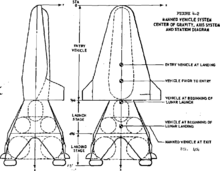| This article includes a list of references, related reading, or external links, but its sources remain unclear because it lacks inline citations. Please help improve this article by introducing more precise citations. (October 2015) (Learn how and when to remove this message) |
| Lunex Project | |
|---|---|
| Moon | |
| Type | Underground Air Force base |
| Site information | |
| Controlled by | United States |
| Site history | |
| Built | Planned to begin after 1967 |
| In use | Project canceled |
| Garrison information | |
| Garrison | 21 USAF personnel |
The Lunex Project was a US Air Force 1958 plan for a crewed lunar landing prior to the Apollo Program. The final lunar expedition plan in 1961 was for a 21-person underground Air Force base on the Moon by 1968 at a total cost of $7.5 billion. The primary distinction between the later Apollo missions and Lunex was the orbital rendezvous maneuver. The Lunex vehicle, composed of a landing module and a lifting body return/re-entry module, would land the entire vehicle and all astronauts on the surface, whereas the final Apollo mission involved a separate ascent module leaving the command module and service module connected in lunar orbit with a single astronaut. The original plan for Apollo was for direct ascent, similar to Lunex.
Design details
Associated vehicles (estimates)

- Crew Size: 3
- Length: 16.16 m (53.01 ft)
- Maximum Diameter: 7.62 m (24.99 ft)
- Span: 7.62 m (24.99 ft)
- Mass: 61 000 kg (134 000 lb)
- Agency: USAF
Location
Selection of base sites were to be made by automated probes, with Kepler crater being a studied location.
Background
Lunex planned to make its first lunar landing and return in 1967, in order to beat the Soviets and demonstrate conclusively that America could win future international competition in technology with the USSR. The Air Force felt that no achievement short of a lunar landing would have the required historical significance.
The use of the direct ascent profile was considered to be the most promising because it eliminated some of the complexities of the Lunar orbit rendezvous that would later be used by Apollo: in particular there would be no need to develop rendezvous techniques in space. The down side was that the Lunex spacecraft would be much heavier than Apollo to carry the extra fuel required to land the entire spacecraft on the Moon and return it to lunar orbit, and consequently a larger rocket would be required to send it to the Moon.
Major "Prestige" milestones
| Date | Milestone |
|---|---|
| April 1965 | First Manned Orbital Flight (3 Man Space Vehicle) |
| July 1966 | First Lunar landing (Cargo) |
| September 1966 | Manned Circumlunar Flight |
| August 1967 | Manned lunar landing and Return |
| January 1968 | Permanently Manned Lunar Expedition |
Problems
The main problems to be solved were:
- Re-entry at 37,000 feet per second, with the flight path within a two-degree angle to avoid overheating or skipping out of the Earth's atmosphere. The latter would not kill the crew directly, but would leave the Earth-return spacecraft in an elliptical orbit where they might be exposed to excessive radiation in the Van Allen belts before the next re-entry opportunity.
- Development of the lunar landing stage, which would have to make a precision landing tail-first on rocket thrust: something never previously tested.
- Development of the lunar launching stage, which had no backup capability, so must be extremely reliable and capable of automated checkout on the lunar surface, and capable of putting the crew into the correct orbit to return to Earth.
See also
- Moonbase
- Project Horizon
- Colonization of the Moon
- Project A119
- Space Launching System
- Zvezda (moonbase)
References
- Mark Wade (2019). "Lunex". Encyclopedia Astronautica. Archived from the original on 4 March 2016. Retrieved 21 November 2020.
- ^ "Lunar Expedition Plan: Lunex" (PDF). Space Systems Division, Air Force Systems Command. May 1961. Archived from the original (PDF) on June 14, 2006. Retrieved 21 November 2020.
- "Lunar Expedition Plan: Lunex" (PDF). Space Systems Division, Air Force Systems Command. May 1961. Archived from the original (PDF) on June 14, 2006. Retrieved 21 November 2020.
- Mark Wade (2019). "Lunex". Encyclopedia Astronautica. Archived from the original on 4 March 2016. Retrieved 21 November 2020.
- Projekt "Lunex" (in German)
- Martin Marheinecke (June 2000). "Projekt "Lunex" Das geheime Mondflugprogramm der US Airforce in den 1960er Jahren" [Project "Lunex" The US Air Force's secret moon flight program in the 1960s]. mmsseiten.de (in German). Retrieved 21 November 2020.
- When the US Air Force Planned a Moon Landing
| Colonization of the Moon | ||
|---|---|---|
| American projects |
|  |
| Soviet and Russian projects |
| |
| Chinese and Russian project |
| |
| Other projects |
| |
| Proposed sites | ||
| Related | ||